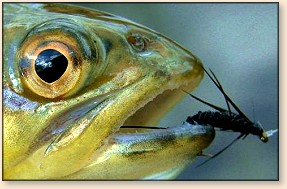|
Is this fish feeling pain? According to Dr. Lynne
Sneddon who led some recent research on the subject
for the Royal Society, Britain's national academy
of science, it is. She goes on to say that trout
have polymodal nociceptors - receptors that respond
to tissue-damaging stimuli - on their heads. In
other words, she believes trout have the proper nerve
receptors, and a sufficient nervous system to feel
and register pain.
This isn't a new argument. PETA (people for the ethical
treatment of animals) has been pushing this largely
unaccepted theory for years, and now they seem to
have an ally in Great Britain. While I suspect Dr.
Sneddon's motives, I suspect her methods even more.
From my side of the street, it appears that the goal
was drawn up before the research began; and that the
research was designed to achieve that goal.
Appearances can be deceiving, and we may never know
the real motive of Dr. Sneddon's group, but there
seems to be a goal here.
Dr. Sneddon's group conducted their research by injecting
the lips of trout with bee venom and acetic acid (the
acidic stuff in vinegar). They then watched the reactions
of those trout to determine if any reactions they had
could be considered painful reactions. When the fish
showed strong reactions, they determined the fish could
feel pain. However, not everyone agrees with their
conclusions.
Dr. James D. Rose, Ph. D., Dept of Zoology and Physiology,
University of Wyoming, wrote a rather detailed response
to Dr. Sneddon's article for a writer from Nature magazine.
In his letter, Dr. Rose explained that Dr. Sneddon's
research doesn't actually deal with pain but rather
a nociceptive response.
For those who don't understand nociception, you're not
alone. I read more than 150 scientific papers about
the subject while trying to understand the nociception,
and I think I have only slightly dented the surface
of the meaning. From what I could gather, nociceptive
responses are the initial reaction to the nerve impulses
that result from injury. Those responses occur in both
conscious and unconscious animals, including humans.
Considering the fact that unconscious people don't
actually "feel" pain, and that is why anesthesia is
used during complex medical procedures, Dr. Rose's
comments might be right, but I wanted to know more.
Of the 150 plus papers I read on the Internet, every
paper dealt with nociceptive pain in mammals except
one, and that was Dr. Sneddon's paper. Several dozen
papers described how nociceptive impulses travel to
and are registered as pain in the neocortex of the
brain (a part of the brain fish don't have).
They also explained how reactions and other responses
to that type of stimulus are controlled by various parts
of the brain, but focused on the neocortex as the area
where pain is registered. OK, so far it's at least
150 to one against Dr. Sneddons research.
Dr Bruno Broughton, Ph.D., one of England's leading
fisheries biologists, agrees with Dr. Rose. Concerning
Dr. Sneddon's research he says, "In particular, although
they found special sensory cells around the mouth of the
fish and drew parallels with the presence of sensory
cells in higher mammals, they did not examine the
capability of the fish's brain to process the
information. Fish just don't have the brains
to recognize pain. The so-called emotional center
of the brain is missing in fish."
From a layman's standpoint, I find it interesting
that they used bee venom on the fish. Considering
the sometimes-deadly reaction to bee venom in humans
that weight more than 150 pounds, I would suspect that
any long-term reaction in a fish that weighs less than
three pounds to be more than a pain response. Dr. Rose
indicated the same thoughts in his response. In his
words: "In light of the probable intensity and sustained
nature of this noxious stimulus, it is quite likely that
a physiological and/or endocrine stress response was
elicited in the trout to a much greater degree than
procedures to which control fish were exposed. A
physiological response of this type is known to alter
the ongoing behavior and physiological function of
trout and is perfectly understandable, but it is not
evidence of a pain experience."
Understandably, the animal rights groups are pointing
to Dr. Sneddon's research as a reason to immediately
ban all types of fishing. One commentator on MSNBC
news made some emotional comments in the same direction.
The focus of these groups appears initially to inflame
a response in anyone who will buy their claims and Dr.
Sneddon's research.
I also find it interesting that the animal rights
communities were some of the first people notified
of Dr. Sneddon's research results. I don't know if
she has ties to those groups or not; and it probably
doesn't matter. From what I've been able to find
in my research on this subject, Dr. Sneddon appears
to be one woman crying out in a forest of people who
don't agree with her findings.
Let's explore for a moment the idea that PETA might
be able to win this game and find a way to ban all
fishing. Would the fish gain from that move? As
a species, would trout gain from a total ban on all
trout fishing? I don't think so. In fact, I would
bet that the real losers would be the fish that PETA
says they are trying to protect.
If all fishing were banned, a multi-billion dollar
industry would come to a screeching halt. Considering
there is a tax on fishing related items, and that the
tax is largely used to promote things that benefit fish
and fisheries, fish would be big-time losers. Also,
considering the many hours of donated time and many
donated dollars fishermen freely put back into the
fisheries in the form of stream and other fisheries
projects, the fish would lose again. Add to that the
money spent by fishermen and the fishing industry to
fight fish diseases and other things that adversely
impact fish and fisheries, the fish lose again.
Who would fight for stream and fisheries improvements
if fishing were banned? Who would be the watchdog
against aquatic pollution and other factors that
threaten our fisheries if that happened? Would
PETA step up and care for our fisheries? I don't
think so. Why would a group who has earned a
reputation as the nation's largest euthanizer of
cats and dogs spend a dime to help fish? Heck, a
few years ago they spent less that .03% of their 15
million donated dollar budget on animal shelters,
and roughly 30 times that amount on the legal defense
and family income of a terrorist who, in the name of
animal rights, destroyed medical research labs working
on a cure for cancer. Does that sound like a group
that would step up to fill the gap in funding for
fisheries? I don't think so.
If PETA were to find the support to end all fishing,
then the fish would feel the pain. Not the individual
pain PETA and Dr. Sneddon are talking about; but the
pain of lost habitat, impossible living conditions,
deadly diseases, inhospitable waterways, and neglect.
Who would fight to restore struggling species to their
historically healthy populations and waterways? Who
would repair spawning grounds and feeding places after
floods and other natural or unnatural things happen
to them?
If not for fishermen, this kind of work would never
get done. Fishermen generously spend their time and
money to benefit fish and fisheries everywhere on this
planet. If you remove fishermen from the equation,
the fish lose. And, I guarantee you animal rights
groups, and one Dr. Sneddon in Great Britain won't
step up to fill the gap.
Do fish feel pain? According to the vast majority of
the scientific community, no, fish do not individually
feel pain. However, if special interest groups are
allowed to have their way, fish as a species, will
feel more pain than they have in centuries.
~ AC
|





